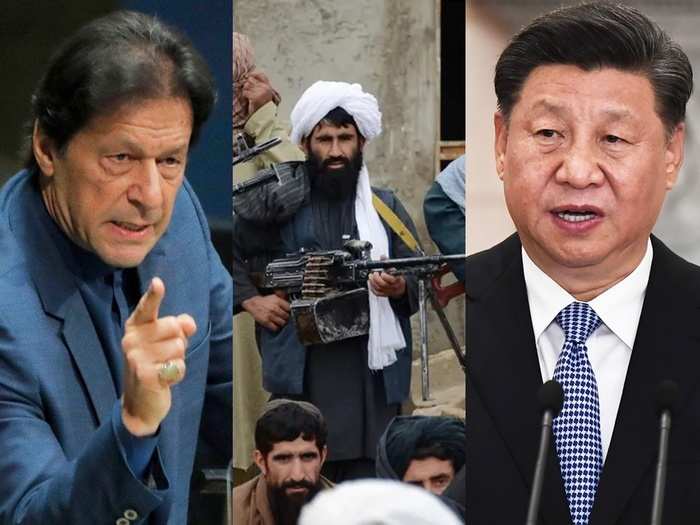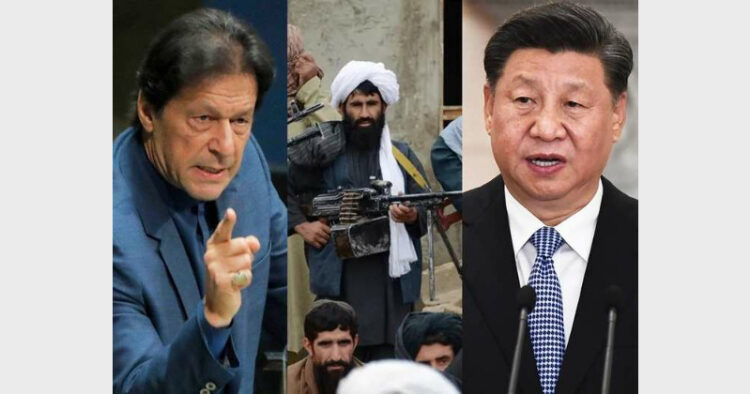A grave concern for the Xi Jinping regime is that the Pakistani Taliban has had ‘relations’ with Uyghurs in China for many decades.

New Delhi: As the Taliban advanced into Kabul on Sunday, Aug 15, most countries were surprised. A few in the region perhaps had moments of joy as Uncle Sam left leaking wounds like the proverbial tiger.
However, both China and Pakistan–so far well-known friends of the Taliban could also land into trouble because the nature of religious fanaticism mixed with the barrel of the gun is such.
This is generally understood as the ‘Talibanisation’ of mindset. Another fact that is not understood in India is that an overwhelming section of poor and rural people endorse Islamic radicalism in Pakistan.
Those in the knowledge of things in Delhi say that much before the Taliban had attained success and the speed with which they ejected Ashraf Ghani dispensation, Tehrik-i-Taliban in Pakistan (TTP) has started flexing muscles.
In Karachi, for instance, the infamous funds drive had started yet again–this was something that was stopped or put at a halt during the last few years.
It is well known that Pakistan has turned into a real-time sanctuary for the Afghan Taliban, and the organisation’s Central Council had also shifted its base to Pakistan.
“Pakistani Taliban has also targeted the Chinese in the recent past, forcing Beijing to raise eyebrows. Moreover, another reason for concern for the Xi Jinping regime is that the Pakistani Taliban has had ‘relations’ with Uyghurs in China for many decades. The greatest concentration of Muslims in China is in Xinjiang, with a significant Uyghur population. This region is also known as East Turkestan. Western experts say China falsely claims East Turkestan as part of China.”
It is important to note that the fact Pakistani establishment supports Afghan Taliban is well known.
A big-time challenge is that a large section of Pakistani commoners or civil societies supports the Taliban–both the Afghan group and their TTP.
Another source who has handled Jihadi militancy in the region says if one radical group rises and starts making its presence felt, even certain ‘latent’ groups would be encouraged to try their luck as well.
Taking some of these aspects into consideration, Elizabeth Threlkeld of Simson Centre in Washington says, “Pakistan is really in a bind”.
For the time being, of course, Taliban actions on the battlefield have been pretty fast and smooth, but there will be ‘spill over violence’ after a while.
“They will also have to cope with the challenge of influx of refugees. This will be inevitable,” a source said.
The problem with allowing too much of ‘power-politics game’ involving religion is that contests will now be between various schools of religion (read Islam).
“Whose religion should prevail will be another question,” the man in the know of things said.
“In the 1960s, Pakistan faced a situation wherein 26 Ulemmas claimed that their respective version(s) of Islam–and ‘who is a Muslim’ – ought to be respected and accepted by others. So, here too, violence could set in. Various Sufi groups have also been attacked in Pakistan, so are other groups, like Bohras and Ismailis. Now, ‘radicalisation’ would be only creeping in at a faster pace from Afghanistan.”
For its part, the Afghan government, even a fortnight back, has attacked Pakistan for fomenting troubles in Afghanistan by helping the Taliban.
A former Afghan MP, Shukria Barakzai, angrily said that “The monster they are supporting will come for them (Pakistan) tomorrow.”
Between Pakistan and China, there has been another key but very sensitive issue.
Baluchistan elements have been lately targeting Chinese interests, which may add to the problems in the form of a ‘wedging’ war between two ‘iron brother’ allies.
The big issue for both Beijing and Islamabad will be to ensure that the radical groups do not get ‘inside depth’ either in rural China or rural Pakistan.
There is a dichotomy between how officials in Pakistan perceive their interests will be served to have Taliban as ‘friends’ and how the societies in both Pakistan and China look at what is happening around them.













Comments